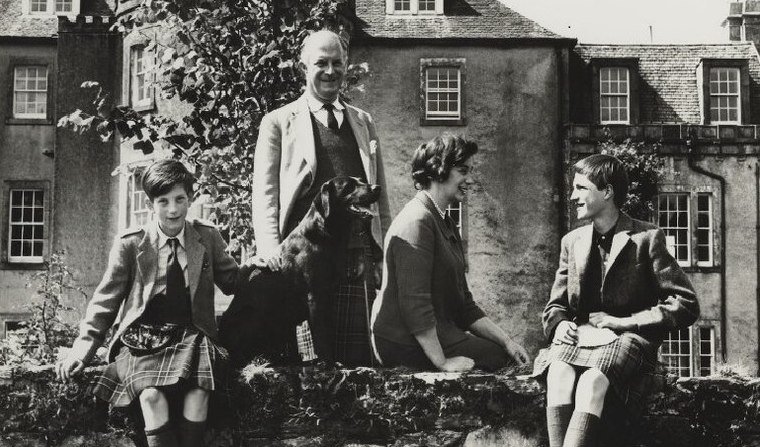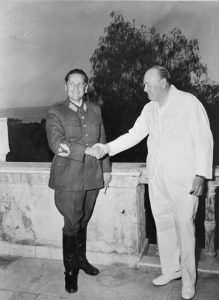
Wit and Wisdom: Fitzroy Maclean, 1911-1996
Sir Fitzroy Hew Royle Maclean KT CBE was a swashbuckling adventurer, soldier, writer and politician. In the Second World War he was Churchill’s personal representative to Tito, who led Yugoslav Partisans against the Germans. One of my great privileges was knowing him and Lady Veronica, and hearing their captivating recollections. (Updated from 2016.)
Proofing galleys for Winston S. Churchill: Document Volume 20, May-December 1944, the Hillsdale College Churchill Project came across many gems. Not least of these was an account by Fitzroy of Churchill’s first meeting with Tito—and a minor adventure in Bay of Naples in August 1944.
Maclean on Tito
I found him to be a tough, alert man of about fifty, at the head of a far more formidable resistance movement than anyone outside Yugoslavia could possibly have imagined…. He made no bones about being a Communist, but… he showed a surprising independence of mind, and above all an intense national pride which did not at all fit in with my idea of a Russian agent. All this I reported to Mr. Churchill [in late 1943]…. I thought it right to remind him that the Partisans were Communist-led.
“Do you intend to make your home in Yugoslavia after the war?” he asked.
“No,” I replied.
“Neither do I,” he said. “That being so, don’t you think we had better leave it to the Yugoslavs to work out their own form of government? What concerns us most now is who is doing the most damage to the Germans.” Thinking our conversation over afterwards, I felt convinced, and still feel convinced, that this was the right decision.
[Tito indeed proved to be a Communist, but one with ardent independence, who balked at following the Soviet line. As a schoolboy I remember maps of the Soviet empire, its nations colored red, except for Yugoslavia, which was always colored pink.]
The PM and Tito

They met in Naples on 12 August at what had been Queen Victoria‘s summer villa. Tito was wearing a splendid new uniform which Fitzroy was sure had been made for the occasion. Although suffering from the heat, Tito “looked every inch a Marshal, which he had just made himself.” With Tito were two gigantic bodyguards, Boško and Prlja, who, with submachine guns at the ready, kept a constant watch over him.
It was at lunchtime when Churchill, with all his cowboy instincts, almost caused an international incident. It might have ended with the death of the Prime Minister by semi-friendly fire. Sir Fitzroy recalled:
At one o’clock precisely, we broke for lunch. The villa was large enough to provide freshening-up facilities for each delegation. Accordingly, the Prime Minister and I disappeared down one long corridor. Tito and the two bodyguards, their submachine guns still at the ready, went off down another, running at right angles to each other.
Five minutes later, having washed our hands, we made our way back, converging from different directions on the same corner. It was thus that the Prime Minister found himself looking down the barrels of two submachine guns.
Boško’s and Prlja’s near-miss
This, I realized too late, was the sort of situation that appealed to him immensely. He at once entered into what he imagined to be the spirit of the thing. Whipping his large gold cigar case out of his pocket like a pistol and suddenly lunging forward, he presented it in one abrupt movement at Tito’s stomach.
What he didn’t know, but I did, was that Boško and Prlja, after three years as guerrillas, were men of lightning reflexes who took no chances at all. If they thought their Marshal’s life was in danger they would gladly have wiped out all three of the Big Three in a single burst.
In the space of a split second I saw their trigger fingers twitch. I only had time to hope that I for one would not survive what came next.
Then Tito began to laugh. Winston, seeing that his little joke had been a success, laughed too. Boško and Prlja, observing that the danger had passed, lowered their guns. Following on into Queen Victoria’s fusty dining room, I took out a large khaki handkerchief and wiped the cold sweat off my brow.
“Careering around the Bay of Naples”
During Churchill’s stay in Naples, an urgent decision was needed from the PM, who was nowhere to be found. Someone mentioned that he had said he was going swimming in the Bay of Naples. The Allied commander instructed Fitzroy Maclean to find him:
The Royal Navy kindly provided a motor torpedo boat, and the United States Army a stenographer—a young lady of considerable personal attractions, in a form-fitting tropical uniform…..
The first thing we saw as we emerged from the harbour into the wider waters of the Bay was a great fleet of ships of every size and shape, steaming majestically towards the open sea. It was the first phase, as I suddenly realized, of the Allied invasion of the south of France….
As we watched, one of the troop ships slightly slackened speed, as if to avoid something. Simultaneously there was a burst of excited cheering from the troops on board, and a small, bright blue object shot across their bow. I recognized it as an admiral’s barge. And there, standing by the coxswain, wearing a boiler suit and a broad-brimmed Panama hat, smoking a cigar and giving the “V” sign, was the object of my search.
Royal Navy greetings
He swerved out and round and disappeared behind the next ship in the convoy. Clearly there was nothing for me but to give chase…. We set out boldly on our erratic course down the line. As we passed them, the troops on the transports gave us an extra cheer for luck—followed by a salvo of whistles as they spotted my female companion….
Eventually, we overtook and headed off the blue barge. There followed an intricate boarding operation in rather a rough sea. I landed precipitously in my kilt at the Prime Minister’s feet. The blonde stenographer, anxious to miss nothing, hung over the rail of the MTB.
Mr. Churchill seemed keenly interested. “Do you usually,” he asked, “spend your afternoons careering around the Bay of Naples in one of His Majesty’s ships with this charming young lady?” In vain I explained the object of the exercise. He wouldn’t listen. I was not to hear the last of that episode for a long time.
Sir Fitzroy on WSC
I should not like to give the impression that all Fitzroy had to say was jocular. His memoranda to Churchill crucially influenced British policy in the Balkans and his evaluations of Tito and other players in Yugoslavia was uniformly accurate. Nevertheless, these wonderful snippets are worth recalling, if only as a testimony to what he always considered the premier experience of his life.
He spoke to us twice on the Churchill tours my wife and I conducted. The venue was his Creggans Inn in Strachur, on Scotland’s Kintyre Peninsula. He spoke movingly and I think profoundly on the Great Man he’d known so well:
Today, looking back over a long life, I can honestly say that almost the only things in which I take any conscious pride or esteem in one way or another is my association with Winston Churchill. After the war I was lucky enough to be a member of his Government and also, with my wife, to be asked every now and then to Chequers or Chartwell to join him and his family in their noisy, affectionate, hilarious, often uproarious family life. That, as a friend said to me the other day, was something that left you both wiser and also warmer at heart.
After our meeting in Naples I asked Tito, a most perceptive man, what had struck him most about Winston. Tito replied instantly and I thought it was very clever of him: “His humanity. He is so human.”
By this central humanity, and his statesmanship and courage, Churchill did something that not many politicians seem to do nowadays. He caught people’s imagination and won their affection.
When I heard of his death I was on the hill here with my head shepherd. Not a man much given to sentiment, he was greatly moved. “I feel,” he said, “as if I’d lost one of my own family.”
That is how, I think, many of us felt and still feel today.







2 thoughts on “Wit and Wisdom: Fitzroy Maclean, 1911-1996”
Thank you for the MacLean piece. As a Scottish-American, I first came to Sir Fitzroy’s writings via his Scottish history contacts with Churchill. One of my earliest published reviews for Military History was of his Highlanders: A History of the Scottish Clans….
–
“No single group of inhabitants of the British Isles inflicted more serious setbacks on the English conquest of their lands than the Scottish Highlanders. English defeats like Stirling Bridge, Bannockburn and Prestonpans must permanently coexist with victories like Falkirk, Flodden and Culloden in British history books. But if the Scots made formidable foes, the English found them to be good men to have on their side in the centuries following the final fall of the old Scottish Highland clans at Culloden on April 16, 1746. Waterloo, the Alma, Ypres, El Alamein and Port Stanley are only a few of the battles in which Highlanders made a vital contribution toward victory.”
–
MacLean’s glossary of clan tartans and brief histories is both compelling and enlightening. The cover price of his last great work should not deter prospective purchasers, because the book is worth every penny. Highlanders is a wondrous resource for the military historian in general, and certainly a must for anyone whose “blood is strong” and whose “heart is Highland.”
–
Thanks, WJS. A link to your review is provided above. —RML
Great article. A favourite book of mine is his Eastern Approaches, an amazing account of his adventures prior and during the Second World War.
–
Thanks, Terry. Most of the quotes in my piece are from Eastern Approaches. After joining the Foreign Office Fitzroy asked to be sent to Moscow (they were astonished—no one ever did), because he wanted to get to the fabled cities like Bokhara and Samarkand. And of course he did, though Soviet Central Asia was officially off limits to foreigners. When the war came he got round the ban on F.O. personnel joining the army by resigning and running for Parliament—MPs could enlist. In 1942 Churchill introduced him to Smuts: “Here is the young man who has made a Public Convenience of the Mother of Parliaments.” —RML
Comments are closed.